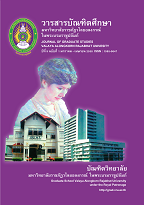ปัจจัยดึงดูดการลงทุนโดยตรงจากต่างประเทศในประเทศไทย THE FACTORS THAT ATTRACT FOREIGN DIRECT INVESTMENT IN THAILAND
Main Article Content
บทคัดย่อ
บทคัดย่อ
การวิจัยนี้มีวัตถุประสงค์เพื่อ 1) ศึกษาปัญหา และอุปสรรคของการลงทุนโดยตรงจากต่าง ประเทศในประเทศไทย 2) ศึกษาปัจจัยดึงดูดการลงทุนโดยตรงจากต่างประเทศในประเทศไทย และ 3) วิเคราะห์และเสนอแนวทางการส่งเสริมการลงทุนโดยตรงจากต่างประเทศในประเทศไทย โดยมีวิธีการวิจัยแบบผสานวิธี มีกลุ่มตัวอย่าง 540 บริษัท โดยสุ่มตัวอย่างแบบง่ายจากจำนวนประชากร 1,020 บริษัท ซึ่งเป็นบริษัทที่มีต่างชาติถือหุ้น และเข้ามาลงทุนในประเทศไทยโดยได้รับการส่งเสริมการลงทุน ครอบคลุมทุกประเภทกิจการที่เปิดให้การส่งเสริมการลงทุน ได้แก่ กิจการเกษตรกรรมและผลิตผลจากการเกษตร กิจการเหมืองแร่ เซรามิกส์ และโลหะขั้นมูลฐาน อุตสาหกรรมเบา กิจการผลิตผลิตภัณฑ์โลหะ เครื่องจักร และอุปกรณ์ขนส่ง กิจการผลิตผลิตภัณฑ์อิเลกทรอนิกส์และเครื่องใช้ไฟฟ้า กิจการผลิตเคมีภัณฑ์ กระดาษ และพลาสติก และกิจการบริการและสาธารณูปโภค และวิเคราะห์ข้อมูลโดยใช้โปรแกรมสำเร็จรูปทางสถิติ
ผลการวิจัยพบว่า
1. ปัญหาและอุปสรรคของการลงทุนโดยตรงจากต่างประเทศในประเทศไทย มีดังนี้ บริษัทส่วนใหญ่ประสบปัญหาด้านแรงงาน กล่าวคือแรงงานมีความชำนาญไม่พอ (ร้อยละ 28.33) ปริมาณแรงงานไม่เพียงพอ (ร้อยละ 25.02) แรงงานที่มีฝีมือหายาก (ร้อยละ 20.92) แรงงานเรียกร้องค่าจ้างสูงเกินไป (ร้อยละ 15.18) และแรงงานเข้า – ออก บ่อย (ร้อยละ 10.55) ปัญหาด้านวัตถุดิบ ส่วนใหญ่บริษัทมีปัญหาด้านคุณภาพวัตถุดิบในประเทศไทยไม่ดี (ร้อยละ 35.57) วัตถุดิบในประเทศไทย มีปริมาณไม่เพียงพอ (ร้อยละ 31.85) ราคาวัตถุดิบในประเทศไทยแพงกว่านำเข้า (ร้อยละ 16.66) และไม่มีวัตถุดิบในประเทศไทย (ร้อยละ 15.92) ปัญหาด้านเครื่องจักร บริษัทส่วนใหญ่มีปัญหาด้านเครื่องจักรหลักที่มีผลิตในประเทศไทยมีราคาแพง (ร้อยละ 49.62) เครื่องจักรหลักไม่มีผลิตในประเทศไทย (ร้อยละ 32.40) และประเทศไทยไม่มีศูนย์ซ่อมเครื่องจักร (ร้อยละ 15.00) ปัญหาด้านโลจิสติกส์ บริษัทส่วนใหญ่มีปัญหาด้านถนนและระบบราง (ร้อยละ 44.62) ปัญหาด้านท่าเรือ (ร้อยละ 36.66) และปัญหาด้านท่าอากาศยาน (ร้อยละ 12.03) ปัญหาด้านกฎ ระเบียบราชการ บริษัทส่วนใหญ่มีปัญหาด้านกฎ ระเบียบราชการที่ไม่ชัดเจน (ร้อยละ 44.25) และปัญหาด้านกฎ ระเบียบซ้ำซ้อนต้องติดต่อหลายหน่วยงาน (ร้อยละ 40.00)
2. ปัจจัยดึงดูดการลงทุนโดยตรงจากต่างประเทศในประเทศไทย ด้านปัจจัยระดับประเทศ ได้แก่ ที่ตั้งของประเทศไทย ตลาดอาเซียน อัตราภาษีเงินได้นิติบุคคล และความพร้อมในการเข้าร่วมประชาคมอาเซียนของไทย ด้านปัจจัยระดับจังหวัด ได้แก่ สัมฤทธิ์ผลของนโยบายของท้องถิ่น การมีส่วนร่วมของชุมชน สภาพแวดล้อมทางสังคม สิทธิประโยชน์ด้านการลงทุน และศักยภาพของแหล่งกระจายสินค้า ด้านปัจจัยระดับบริษัท ได้แก่ ต้นทุนค่าขนส่ง ต้นทุนการผลิต ความสามารถในการแข่งขันของบริษัท การได้รับสิทธิประโยชน์ยกเว้นอากรขาเข้าวัตถุดิบ และต้นทุนการดำเนินการ
ผลจากการสัมภาษณ์เชิงลึกผู้บริหารบริษัทต่างชาติ สอดคล้องกับที่กล่าวมาข้างต้น กล่าวคือปัจจัยดึงดูดการลงทุนโดยตรงจากต่างประเทศที่สำคัญ เพื่อขยายตลาดในประเทศไทยและตลาดอาเซียน ซึ่งเป็นตลาดที่ใหญ่และกำลังขยายตัว การมีต้นทุนการผลิตต่ำกว่าลงทุนในประเทศตน ประเทศไทยมีที่ตั้งที่เหมาะสม และรัฐบาลไทยมีนโยบายส่งเสริมการลงทุนโดยตรงจากต่างประเทศ
3. แนวทางการส่งเสริมการลงทุนโดยตรงจากต่างประเทศในประเทศไทย ควรเน้นส่งเสริมกิจการที่ใช้เทคโนโลยีที่ทันสมัย กิจการวิจัยและพัฒนา และกิจการบริการและสาธารณูปโภค เพื่อเพิ่มความสามารถในการแข่งขัน และเพื่อพัฒนาอุตสาหกรรมให้มีความยั่งยืนต่อไป
ABSTRACT
This research has three objectives. 1) to discover problems and obstacles of foreign direct investment in Thailand. 2) to study the factors by which foreign direct investment in Thailand can be attracted. 3) to analyse the characteristic of foreign direct investment and propose methods used for supporting direct investment from foreigners in Thailand. To gather the information for research, the survey has been conducted on the firms, 540 samples in total of 1,020 firms, which have foreign shareholders, invest in Thailand, and are supported by Board of Investment (BOI) i.e. agriculture and agricultural products; mining, ceramics and basic metals; light industry; metal products, machinery and transport equipment; electronic industry and electrical appliances; chemicals, paper and plastic; services and public utilities.
The research has shown that
1. In term of problems and obstacles, most companies have experienced 5 problems. The first problem is labour issue, including lack of skilled labour, insufficient labour (at 25.02%), a lack of highly skilled workers (at 20.92%), excessively high wage (at 15.18%), and high turnover rate (at 10.55%). The second problem is raw materials. The result has shown that most of raw materials in Thailand are low quality (at 35.57%). There are not enough raw materials (at 31.85%). Cost of the local raw materials is more expensive than imported ones (at 16.66%). The raw materials are not available in Thailand (at 15.92%). The third problem is the machine. The main machines manufactured in Thailand are expensive (at 49.62%). The main machines are not produced in Thailand (at 32.40). There is no maintenance service in Thailand (at 15.00%). The fourth problem is logistics; most companies have a problem with road and rail system (at 44.62%), ports (at 36.66%), airports (at 12.03%). Finally, the fifth problem is bureaucratic rules are ambiguous (at 44.25%). Most companies have to contact several organizations which make the business process very complicated (at 40.00%)
2. Foreign direct investments in Thailand are attracted by several factors. The national factors sorting by its importance are Thailand location, ASEAN market, tax rates and the readiness of Thailand to join ASEAN. The local factors includes the effectiveness of local policy, local contribution, social environment, investment benefits, distribution potential. Finally, other factors are transportation cost, production cost, competitive advantages and operation cost.
Information from executives’ in-depth interviews of foreign companies support this research. They would like to invest in Thailand because Thailand is a big market; in addition, it is going to join with other countries in ASEAN. In other words, Thailand market is expanding nowadays. Moreover, the cost of production in Thailand is lower than in their own countries. Also Thailand have good location. On the top of that, Thai government's policies always support investment from abroad.
3. The effective ways to promote foreign direct investment in Thailand is to focus on promoting the use of modern technology, research and development, services and public utilities in order to enhance the country’s competitive advantages and sustainable development of the industry.
Article Details

อนุญาตภายใต้เงื่อนไข Creative Commons Attribution-NonCommercial-NoDerivatives 4.0 International License.
บทความทุกเรื่องได้รับการตรวจความถูกต้องทางวิชาการโดยผู้ทรงคุณวุฒิ ทรรศนะและข้อคิดเห็นในบทความ Journal of Global of Perspectives in Humanities and Social Sciences (J-GPHSS) มิใช่เป็นทรรศนะและความคิดของผู้จัดทำจึงมิใช่ความรับผิดชอบของบัณฑิตวิทยาลัย มหาวิทยาลัยราชภัฏวไลยอลงกรณ์ ในพระบรมราชูปถัมภ์ กองบรรณาธิการไม่สงวนสิทธิ์การคัดลอก แต่ให้อ้างอิงแหล่งที่มา


